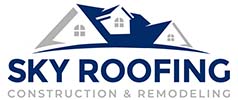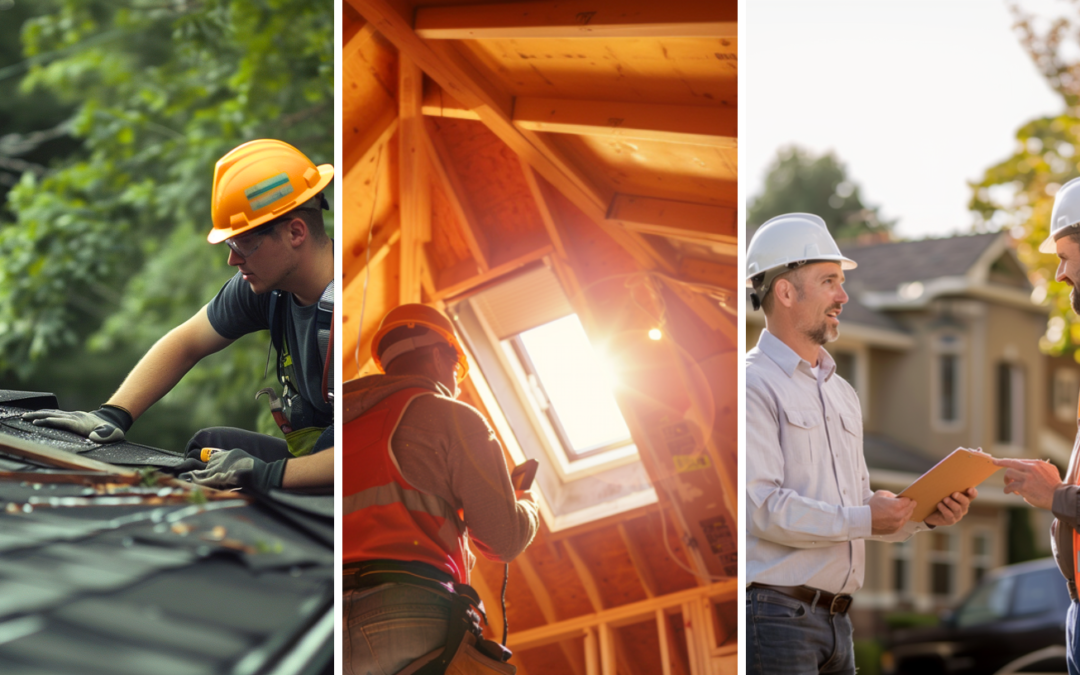An Overview of Inspection in Roofing
The significance of roof inspections cannot be overstated, as neglecting them can lead to severe risks and long-term consequences. One of the primary risks is the possibility of leaks, which can result in water damage, mold growth, and compromised structural integrity. Without regular inspections, these leaks may go unnoticed until they cause significant damage to the property.
Furthermore, neglecting roof inspections can lead to various long-term consequences. Over time, minor problems such as loose or missing shingles can escalate into more extensive issues that require costly repairs or even a full roof replacement. Routine inspections can identify these problems early on, allowing for prompt and more affordable repairs.
Scheduling regular roof inspections is paramount for maintaining a property’s overall integrity and value. Property owners can avoid long-term consequences and enjoy a secure and long-lasting roof by addressing potential risks and ensuring prompt repairs.
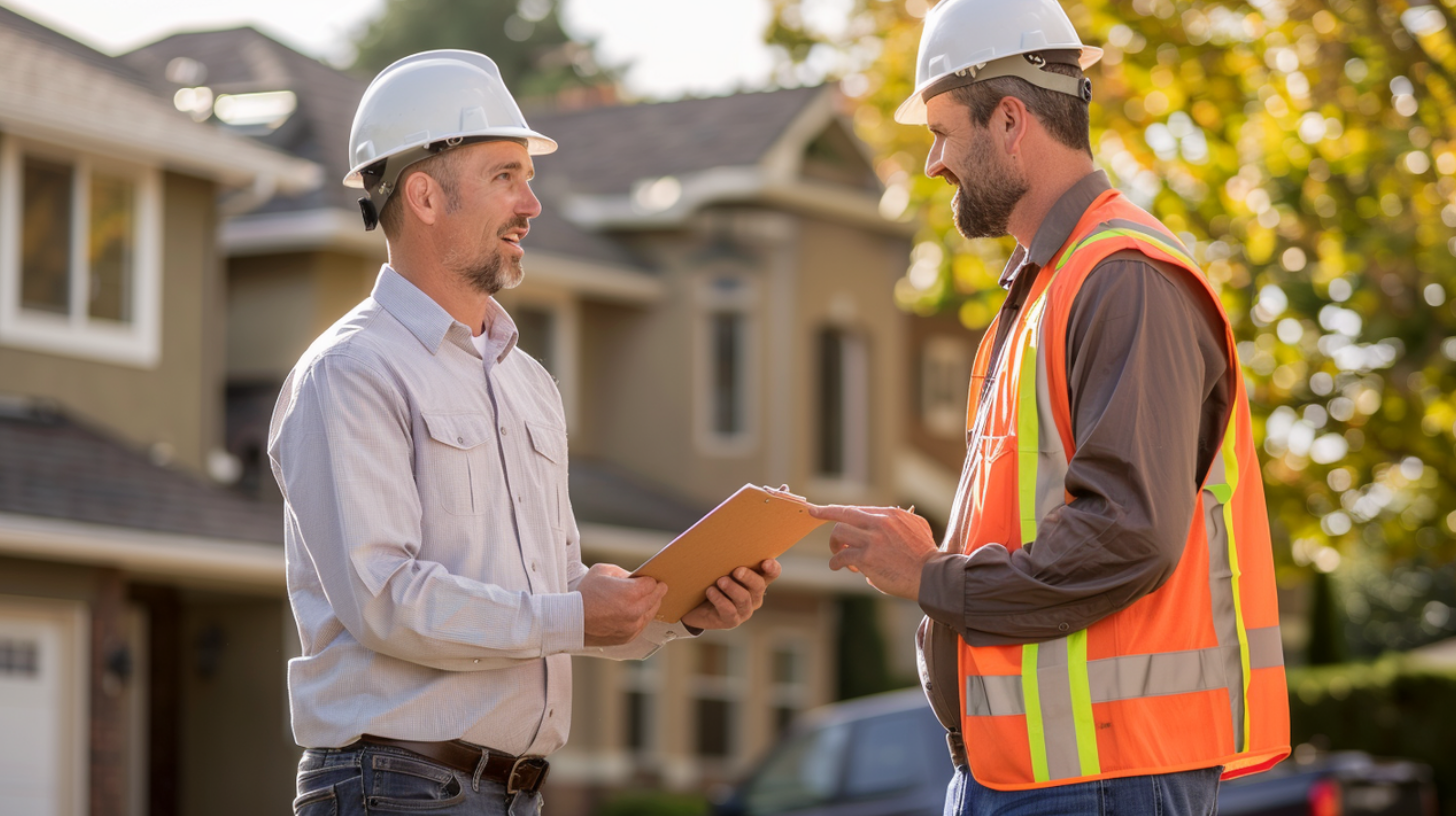
Inspection - Why Roofing Inspections Matter - Sky Roofing Construction & Remodeling
Why Roofing Inspections Matter
Early Detection of Issues
Regular checks are an important way to identify any potential problems with the roof. Homeowners should conduct visual inspections, looking for signs of wear and tear, missing shingles, or water stains on the ceiling. These regular checks can be done without cost but require time and effort.
Another effective method is to have the roof inspected by a professional roofer. These professionals are trained to identify hidden issues and can thoroughly assess the roof’s condition. While this method comes with a cost, it is worth it for the expertise and accuracy of the inspection.
Advanced technology, such as drones or infrared devices, can detect issues that may not be visible to the naked eye. Drones can provide a detailed aerial view of the roof, allowing for a comprehensive inspection. Infrared devices can detect moisture or leaks within the roof’s structure. However, these methods may require additional costs for equipment and hiring specialized technicians.
Early detection can prevent further damage, reduce the risk of leaks and water damage, and extend the roof’s lifespan. Addressing issues early on can also save homeowners from costly repairs in the future. While each detection method may have associated costs, the investment is worthwhile for the long-term protection and maintenance of the roof.
Extending Roof Lifespan
Regular maintenance is key to preserving your roof’s integrity. This includes cleaning the gutters, removing debris, and inspecting for any signs of damage. By addressing minor issues promptly, such as loose shingles or small leaks, you can prevent them from escalating into major problems.
Proper ventilation and insulation also play vital roles in extending your roof’s lifespan. Adequate ventilation helps regulate temperature and moisture levels, preventing the buildup of condensation that can damage your roof. Insulation keeps your home energy-efficient and helps prevent ice dams, reducing the risk of roof damage.
However, professional inspections may be the most essential factor in extending a roof’s lifespan. Regularly scheduling inspections by experienced roofing contractors ensures that any underlying issues are detected early. They have the expertise to identify potential problems that may not be visible to the untrained eye. Addressing these issues promptly can prevent further damage and significantly extend your roof’s life.
Peace of Mind
Roof inspection allows homeowners to detect problems early on, such as leaks or structural damage, which, if left unaddressed, can result in costly repairs or even a complete roof replacement. Knowing that their roof has been thoroughly inspected and is free from significant issues, homeowners can feel confident that their investment is protected and their property is safeguarded.
Furthermore, by ensuring the roof’s structural integrity through regular inspections, homeowners can prevent hazards such as collapsed roofs or water damage. This is especially important for those living in areas prone to heavy rain, snow, or strong winds.
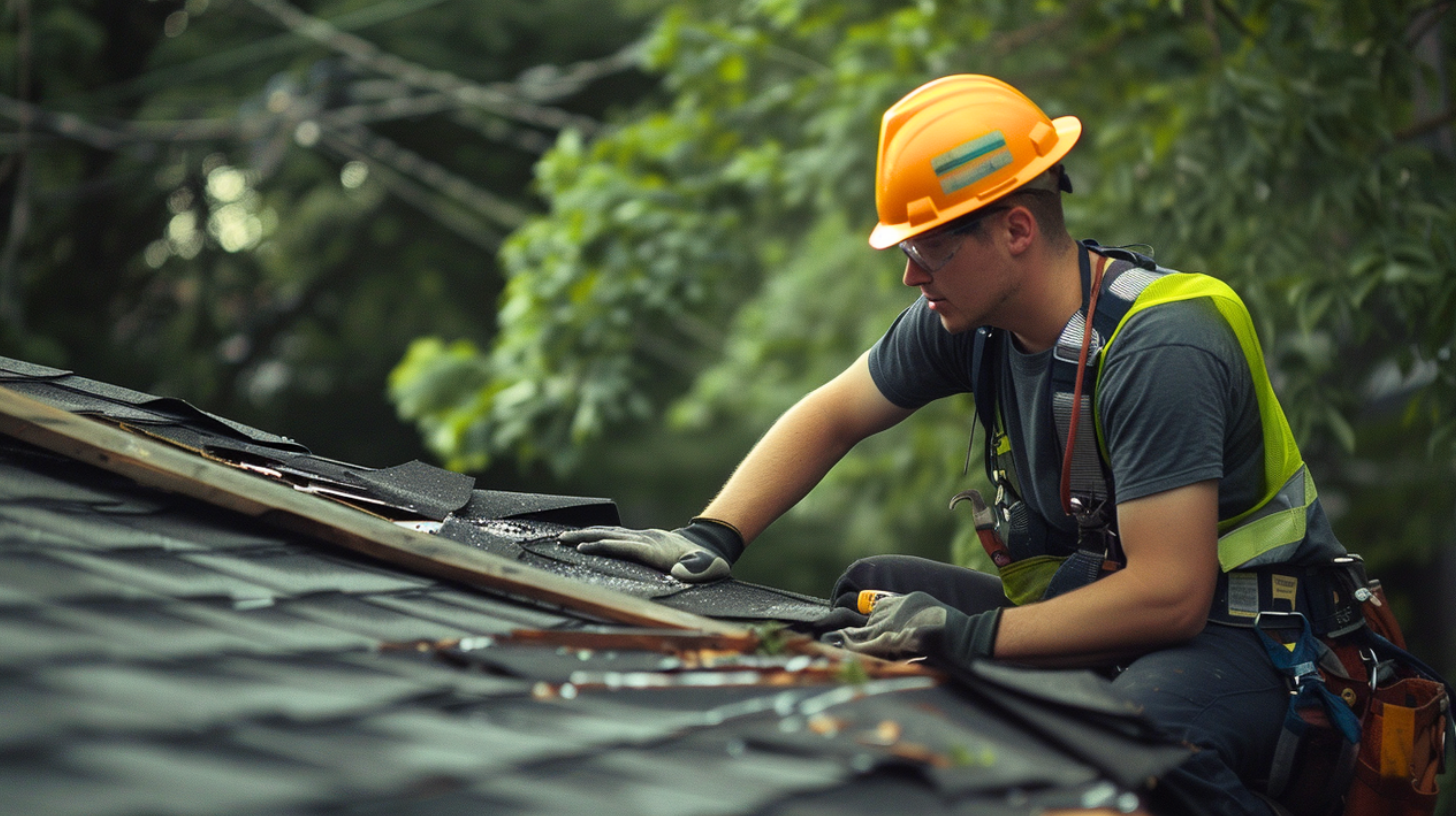
Inspection - When to Schedule an Inspection - Sky Roofing Construction & Remodeling
When to Schedule a Roofing Inspection
Seasonal Inspections
With advancements in technology, roof inspections have become more comprehensive and efficient. Drones now provide aerial views of the roof, allowing inspectors to identify any visible damages or areas requiring maintenance. This method improves safety, eliminating the need for inspectors to climb onto the roof physically.
Infrared technology, including thermometers and cameras, is used during roof inspections. These tools enable inspectors to measure temperature variations and identify potential leaks or moisture issues that are not visible to the naked eye. This technology helps to locate problems early on, preventing further damage and costly repairs.
The benefits of seasonal roof inspections are vast. They allow homeowners and building owners to identify and address issues before they worsen, ultimately saving money in the long run. Regular inspections also extend the lifespan of the roof and prevent major problems from occurring.
After Severe Weather Events
A critical aspect of post-weather event roof inspections is to schedule an assessment with a professional roofing contractor and your insurance company. This can help determine the types of damage incurred and provide grounds for a potential insurance claim. By swiftly scheduling the inspection, you can effectively document the condition of your roof and ensure that all damages are properly assessed and covered.
The inspection report plays a crucial role in determining the condition of your roof. It provides detailed information on any damages caused by severe weather events. The inspection report can also include potential repair or reroofing estimates, helping you plan and budget the necessary repairs or replacements. Special attention should be given to the areas most vulnerable to weather damage to ensure a thorough assessment and effective repair strategy.
Before Buying or Selling a Home
Potential buyers must conduct a roof inspection before finalizing a purchase. This inspection will illuminate the entire roof’s condition, identifying any existing or potential issues such as leaks, damage, or the need for repairs. By knowing the exact roof condition, buyers can negotiate a fair price, ensuring they are aware of costly repairs shortly after moving in. Moreover, the roof inspection acts as an additional layer of protection, preventing buyers from investing in a property with an unreliable roof.
Conversely, sellers can also significantly benefit from a roof inspection. By assessing the roof’s condition professionally, sellers can confidently disclose any existing issues, ensuring transparency with potential buyers. Furthermore, addressing necessary repairs or maintenance before putting the property on the market can significantly increase its value and marketability. With a solid and well-maintained roof, sellers can attract more potential buyers and negotiate a higher selling price.
Following Major Roof Repairs
The first step is to conduct a final inspection. This involves thoroughly examining the roof to ensure all repairs have been completed to the standard. It is important to check for loose or missing shingles, damaged flashing, or other signs of potential issues. This final inspection ensures that the roof is in optimal condition and ready to withstand any weather conditions.
Following the final inspection, it is recommended that regular maintenance checks be scheduled. These inspections can identify potential problems early on, allowing for prompt repairs and preventing costly damages. They should be conducted at least twice a year, typically in the spring and fall.
Another important step is considering warranty options for the newly repaired or replaced roof. Many roofing contractors offer warranty options that provide coverage for any future repairs or replacements that may be required. You are advised to carefully review the warranty terms and choose a plan that suits your needs and budget.
In addition to inspecting the roof, it is also essential to inspect the gutters and downspouts. Clogged or damaged gutters can lead to water backup, which can cause damage to the roof and the overall structure of the building. Regular gutter cleaning and inspections should be performed to ensure proper drainage and prevent potential issues.
Lastly, documenting the repairs is recommended for future reference. Keeping records of the repairs, including invoices, receipts, and any before-and-after photos, can be helpful for insurance purposes and for tracking the roof’s maintenance history.
Following these steps, homeowners can ensure that their repaired or replaced roof remains in top condition, providing long-lasting protection for their homes or buildings.
What to Expect During a Roofing Inspection
Exterior Inspection
Missing or damaged shingles are a common concern, as they can expose the roof’s underlying layers to the elements. This increases the likelihood of water infiltration, leading to potential roof leaks and water damage. Similarly, flashing issues, such as loose or damaged flashing around chimneys, skylights, or vents, can create openings for water to enter the roof system.
Additionally, debris buildup, such as leaves, twigs, or branches, can obstruct proper water drainage and cause pooling on the roof surface. This standing water can eventually seep through the roof and cause leaks.
Homeowners and building owners can prevent more significant issues by conducting exterior inspections and roof assessments to promptly address these visible signs of damage.
Interior Inspection
A key aspect of an interior inspection is checking for signs of leaks or water damage. The inspector will examine the attic or ceiling for visible water stains, mold growth, or rot. These indicators suggest that water penetrates the roof and may have damaged the structure. Identifying these issues early on helps prevent further deterioration and potentially costly repairs.
Mold is another concern during an interior inspection. The inspector will closely examine the attic or ceiling for any signs of mold growth. Mold compromises the roof’s integrity and poses health risks to the occupants. Addressing mold issues promptly is crucial for maintaining a safe and healthy living environment.
Lastly, an interior inspection includes checking for water stains and rot on interior ceilings and walls. Water stains indicate previous leaks, while rot suggests prolonged exposure to moisture. Both can indicate underlying issues with the roof and should be addressed promptly to avoid further damage.
By proactively scheduling regular inspections, homeowners can ensure the longevity and durability of their roofing system.
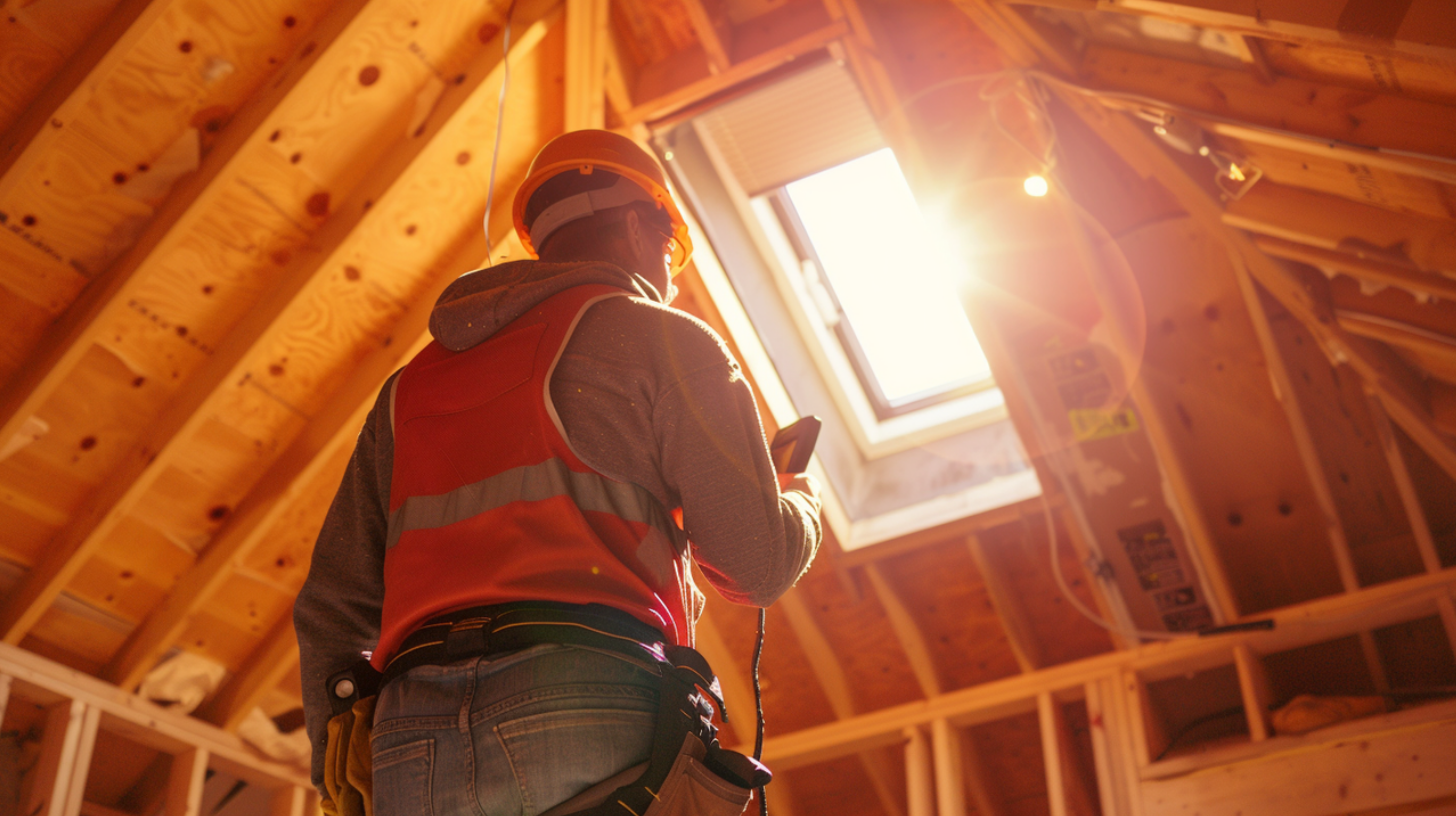
Inspection - Common Issues Found - Sky Roofing Construction & Remodeling
Common Issues Found During Inspections
During roof inspections, professionals often uncover common issues that can potentially compromise the safety and integrity of a home or building. These inspections are crucial in identifying and addressing issues before they become significant problems. Here are some of the common issues that are often found during roof inspections:
1. Leaks and Moisture Damage: Water intrusion is one of the primary concerns in roofing. Inspectors look for signs of leaks, dampness, and water stains that may indicate a compromised roof system.
2. Missing or Damaged Shingles: Over time, shingles can become loose, cracked, or completely missing. These issues can lead to water penetration, which can cause rotting and further damage to the roof structure.
3. Poor Installation: Faulty installation practices or improper materials can result in inadequate flashing or poorly sealed components, weakening the overall roof system.
4. Ventilation Problems: Proper ventilation is crucial for regulating temperature and preventing excess moisture accumulation in the attic. Inspections identify blockages or inadequate ventilation that can lead to increased energy costs and potential roof damage.
5. Aging and Wear: Roofs naturally age and deteriorate over time. Inspections identify signs of aging, such as curled or blistered shingles, granule loss, or a general decline in the roof’s condition.
6. Structural Issues: The roof’s structural integrity is thoroughly examined during inspections. Sagging, rotting, or weakened roof components are identified to prevent potential collapse or further damage.
Roof inspections are essential for detecting these common issues early on. They allow homeowners and building owners to address them promptly and prevent more extensive damage and costly repairs later.
Benefits of Professional Roofing Inspections
Professional inspectors thoroughly examine the roof’s structure, materials, and potential issues to identify any existing or potential problems. With a detailed report from reputable roofing contractors, homeowners can proactively address issues before they escalate into costly repairs or replacements. Roofing inspections help homeowners develop an accurate understanding of the roof’s remaining lifespan, enabling them to plan and budget accordingly.
Moreover, roofing inspections are invaluable during real estate transactions, benefiting buyers and sellers. A professional inspection provides buyers confidence and peace of mind, knowing that an unbiased expert has thoroughly assessed the roof. This knowledge lets buyers make informed decisions and negotiate effectively based on the roof’s condition. On the other hand, sellers can attract potential buyers by providing inspection reports demonstrating the roof’s quality and condition.
Professional roofing inspections offer homeowners and building owners knowledge and peace of mind. These inspections provide valuable insights for budgeting future expenses and instill confidence in individuals involved in real estate transactions. By investing in regular roof inspections, property owners can ensure the long-term integrity of their roofs and make informed decisions regarding maintenance, repairs, or replacements.
Schedule Your Inspection for Long-Term Roof Integrity with Us Today
Inspection is a vital component of maintaining your roof’s integrity and longevity. Regular assessments not only identify potential issues early but also provide peace of mind for homeowners. To ensure your roof remains in top condition, contact Sky Roofing Construction & Remodeling (skyroofingconstructiontx.com/) today to schedule a roofing consultation. Call us at (210) 942-9797 and let our experts help protect your investment with a thorough inspection.
Willis Vachon is a seasoned contributing writer for Sky Roofing Construction & Remodeling, specializing in the technical and safety aspects of roofing construction. With a keen eye for detail and a passion for ensuring quality and safety in every project, Willis provides valuable insights that help both professionals and homeowners make informed decisions about their roofing needs.
